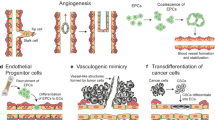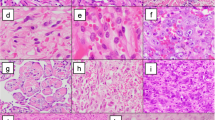Abstract
Neovascularization plays a substantial role in the invasiveness and metastasis of gastric cancer. However, the molecular mechanism underlying the control of neovascularization of gastric cancer remains undefined. Both vascular endothelial growth factor a (VEGFa) and matrix metalloproteinases 2 (MMP2) are essential for neovascularization by promoting endothelial mitogenesis and permeability and by promoting extracellular matrix degradation, respectively. Therefore, we were prompted to examine whether VEGFa and MMP2 may affect expression of each other to coordinate the neovascularization process. We found strong positive correlation of VEGFa and MMP2 levels in the gastric patients. Moreover, patients with metastasis of the original cancer had significantly higher levels of VEGFa and MMP2. Thus, we used a human gastric cancer cell line, SNU-5, to examine whether expression of VEGFa and MMP2 may affect each other. We found that overexpression of VEGFa in SNU-5 cells increased expression of MMP2, while inhibition of VEGFa in SNU-5 cells decreased expression of MMP2. On the other hand, overexpression of MMP2 in SNU-5 cells increased expression of VEGFa, while inhibition of MMP2 in SNU-5 cells decreased expression of VEGFa. These data suggest that expression of VEGFa and MMP2 may activate each other to reinforce a promoting effect on neovascularization. We then analyzed how VEGFa expression affects MMP2 level. Application of a specific Akt inhibitor to VEGFa-overexpressing SNU-5 cells substantially abolished the effect of VEGFa on MMP2 activation, suggesting that VEGFa may increase expression of MMP2 via PI3K/Akt signaling pathway. Since anti-VEGFa is a well-established therapy for many cancers, our data suggest that anti-VEGFa may not only inhibit neovascularization by prohibiting VEGFa-dependent endothelial mitogenesis and permeability increase but also by downregulating MMP2 to abolish the extracellular matrix degradation in gastric cancer.




Similar content being viewed by others
References
Zhao X, Li X, Yuan H. MicroRNAs in gastric cancer invasion and metastasis. Front Biosci. 2013;18:803–10.
Kim JG. Molecular targeted therapy for advanced gastric cancer. Korean J Intern Med. 2013;28:149–55.
Ilson DH. Angiogenesis in gastric cancer: Hitting the target? Lancet. 2014;383:4–6.
Scartozzi M, Giampieri R, Loretelli C, Bittoni A, Mandolesi A, Faloppi L, et al. Tumor angiogenesis genotyping and efficacy of first-line chemotherapy in metastatic gastric cancer patients. Pharmacogenomics. 2013;14:1991–8.
Dufour A, Overall CM. Missing the target: matrix metalloproteinase antitargets in inflammation and cancer. Trends Pharmacol Sci. 2013;34:233–42.
Ferrara N. Vascular endothelial growth factor. Arterioscler Thromb Vasc Biol. 2009;29:789–91.
Xiao X, Prasadan K, Guo P, El-Gohary Y, Fischbach S, Wiersch J, et al. Pancreatic duct cells as a source of VEGF in mice. Diabetologia. 2014;57:991–1000.
Xiao X, Guo P, Chen Z, El-Gohary Y, Wiersch J, Gaffar I, et al. Hypoglycemia reduces vascular endothelial growth factor a production by pancreatic beta cells as a regulator of beta cell mass. J Biol Chem. 2013;288:8636–46.
Cleaver O, Melton DA. Endothelial signaling during development. Nat Med. 2003;9:661–8.
Ferrara N, Gerber HP, LeCouter J. The biology of VEGF and its receptors. Nat Med. 2003;9:669–76.
Carmeliet P, Jain RK. Molecular mechanisms and clinical applications of angiogenesis. Nature. 2011;473:298–307.
Davidson B, Reich R, Risberg B, Nesland JM. The biological role and regulation of matrix metalloproteinases (MMP) in cancer. Arkh Patol. 2002;64:47–53.
Rhee JS, Coussens LM. Recking MMP function: implications for cancer development. Trends Cell Biol. 2002;12:209–11.
Mitra A, Chakrabarti J, Chattopadhyay N, Chatterjee A. Membrane-associated MMP-2 in human cervical cancer. J Environ Pathol Toxicol Oncol Off Organ Int Soc Environ Toxicol Cancer. 2003;22:93–100.
Thompson EW, Yu M, Bueno J, Jin L, Maiti SN, Palao-Marco FL, et al. Collagen induced MMP-2 activation in human breast cancer. Breast Cancer Res Treat. 1994;31:357–70.
Bagri A, Kouros-Mehr H, Leong KG, Plowman GD. Use of anti-VEGF adjuvant therapy in cancer: challenges and rationale. Trends Mol Med. 2010;16:122–32.
Biggs 3rd WH, Meisenhelder J, Hunter T, Cavenee WK, Arden KC. Protein kinase B/Akt-mediated phosphorylation promotes nuclear exclusion of the winged helix transcription factor FKHR1. Proc Natl Acad Sci U S A. 1999;96:7421–6.
Conflicts of interest
None
Author information
Authors and Affiliations
Corresponding author
Additional information
The Publisher and Editor retract this article in accordance with the recommendations of the Committee on Publication Ethics (COPE). After a thorough investigation we have strong reason to believe that the peer review process was compromised.
An erratum to this article can be found online at http://dx.doi.org/10.1007/s13277-017-5487-6.
About this article
Cite this article
Mao, D., Zhang, Y., Lu, H. et al. RETRACTED ARTICLE: Molecular basis underlying inhibition of metastasis of gastric cancer by anti-VEGFa treatment. Tumor Biol. 35, 8217–8223 (2014). https://doi.org/10.1007/s13277-014-2095-6
Received:
Accepted:
Published:
Issue Date:
DOI: https://doi.org/10.1007/s13277-014-2095-6




